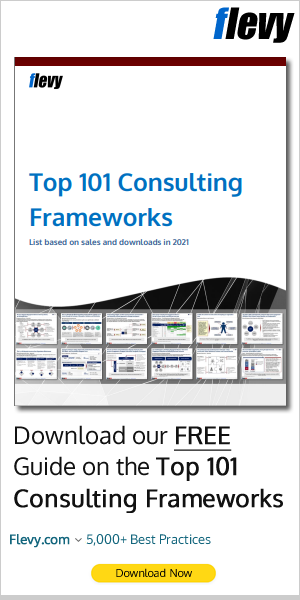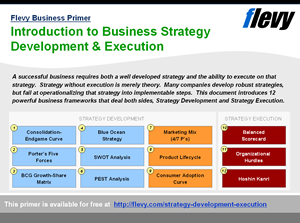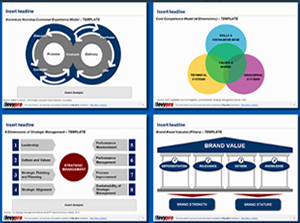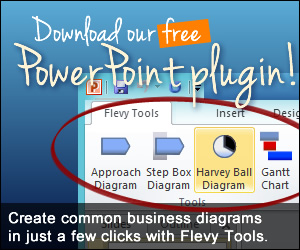Editor's Note: Take a look at our featured best practice, Strategic Plan Template (38-page Word document). This template is a comprehensive template for a Corporate Strategic Plan, and consists of 2 documents: 1. The Strategic Plan Document Template, 38 pages, which is for the main body of the Strategic Plan Document. 2. The Strategic Plan Document Appendices, a 17-page collection of helpful [read more]
Strategy Is Just Like Air
Also, if you are interested in becoming an expert on Strategy Development, take a look at Flevy's Strategy Development Frameworks offering here. This is a curated collection of best practice frameworks based on the thought leadership of leading consulting firms, academics, and recognized subject matter experts. By learning and applying these concepts, you can you stay ahead of the curve. Full details here.
* * * *
I’ve had a great response to my recent post announcing whywhathow (my venture into the world of strategy, performance and governance for not-for-profit and professional services organisations, if you missed it).
So, how will whywhathow make a difference, you might ask? Is my approach really special or unique?
That will ultimately be for others to decide, but I will certainly be challenging some common (mis)conceptions about strategy and strategic planning.

Image copyright Ross Clark
But what does this have to do with “air?” Read on…
It’s a fact that most organisations “do” strategy.
They may do it formally, or informally. Often or rarely. Some don’t even realise they’re doing it. And a few think they’re doing it, but they’re actually not!
For some it’s a challenge, and for many others, a massive chore.
But for something so common, we seem to have a lot of trouble with the simple question: what is strategy?
In fact, trying to define “strategy” can be a little like trying to define “air.”
Most dictionaries describe air along the lines: “the invisible mixture of gases that surrounds the earth and that we breathe.” While this definition is certainly accurate, and informative to a degree, it tells nothing of the complex impacts and influences that air has on people’s lives.
Devastating impacts of cyclones, bushfires, and air pollution. Uplifting feelings from summer breezes, butterflies and jet flights. Fundamental influences on fashion, health and construction. All a reminder that air is much more sophisticated than a simple dictionary definition suggests.
And it’s very similar with strategy.
There are any number of common conceptions and definitions of strategy, but most are unhelpfully limited. Indeed, in the new world of organisational complexity, contradiction and disruption, attempting to settle on a singular, prescriptive definition of strategy is virtually pointless. (As pointless as a singular definition of “air.”)
But if we can’t usefully define strategy, let’s at least identify some key features of effective strategy that are pertinent to today’s organisations.
1. Strategy is not a plan.
Implementing a strategy might be aided by a plan, but a plan, by definition, involves moving step-by-step to some pre-determined outcome. In a stable, predictable world a static strategic plan may have value, but our world is now considerably less stable, and significantly less predictable.
While the terms “strategy” and “strategic plan” are often used interchangeably, they are not the same. Strategic plans are commonly seen as a document, not as the ideas contained in it. But genuine strategy must be embodied in a powerful set of guiding ideas and decisions, which may or may not be formally documented.
2. Strategy must be simple at its core.
Effective strategy needs to be comprehensible and communicable. Not just for a few leaders, but for every single person in your organisation.
It must essentially focus on the basic choices that will influence customers (read clients, members, stakeholders, supporters) to commit (meaning purchase, join, sign-up) to your product (or service, cause, program). These choices are fundamental for any business: who will we target and what compelling value proposition will we offer them?
3. Strategy needs to be responsive and adaptive.
It’s not just about you, but also about the specific business environment that your organisation is operating in. And depending on how foreseeable, pliable and tough that environment is, a different approach to strategy will be called for. Which means, most certainly, that every strategy will need to change–from business to business, from time to time, and even from one product or program to another.
4. Strategy can never be perfect.
Continually honing and refining your strategy in a search of perfection will almost always be unproductive. Think about a watch that’s running five minutes fast. It will still help you navigate your day without too many missed meetings, deadlines or meals, even though it will never be exactly right. Whereas a watch that’s stopped, will be perfectly correct twice a day, but otherwise useless.
5. Strategy must be clear.
Crystal clear. Because to work, to be executable, all the people in the organisation who have any role in influencing its successful delivery have to be able to understand your strategy, internalise it and apply it to all they do.
And understanding “why?” is fundamental for such clarity.
6. Strategy is not risk management.
Strategy is commonly regarded as cool, logical and reassuring. But effective strategy today needs to be at least a little provocative, uncomfortable and challenging. At its centre, strategy is always about change. Otherwise, it’s simply restating the status quo. And change, for most of us, is always a bit uncomfortable.
And in the end, no strategy can guarantee success. It can, and should, make success more likely. But in the end, strategy is a gamble–an educated gamble–but a gamble nonetheless, and it should be recognised for what it is.
7. Strategy is not subservient to time.
One of the most common flaws in modern strategic planning is to frame the ‘strategic plan’ within a predetermined time-scale. 3-year plans or 5-year plans are everywhere. In reality these time-frames are more about saying: “Thank goodness we don’t have to think about our strategic plan for another 3 years” than they are about achieving desirable outcomes. Effective strategy recognises that some target outcomes may be achievable within weeks, while others may take years or even decades.
8. Strategy is about expanding, not narrowing.
Strategy should facilitate moving forward with clear intent and a preparedness to provoke learning and an expanded view of your organisation and its environment. This will always be more effective than planning backwards from some notional perfect future you’ve visualised in detail, and progressively narrowing our options until you achieve it.
9. Strategy must consider what won’t be done, as much as what will be done.
When you develop a strategy to achieve your goals or mission, you need to think about all the things you could do, not just the things you are doing. Otherwise, you will just keep treading down the same pathway, albeit in new boots.
In the end, strategy boils down to a series of decisions about trade-offs. You decide what you will do, which invariably results in having to accept there are things you won’t or can’t do. But provided your team is all agreed, you can move forward with purpose and intent.
10. Strategy is personal.
In the end, organisations don’t implement strategy, people do. And all of your people have their own strategic agendas – some of which are focused on the organisation and some on themselves. So, if your strategic intent is to succeed, much effort needs to focus on creating alignment of personal strategies with your overarching organisational strategy.
Ultimately, strategy has one final important thing in common with air–it’s very easy to move it to the back of your mind and take for granted. But if you do, someday you might just pay the price.
So, these are a few of my thoughts about strategy, but what about yours…?
Hopefully, some of what I’ve said above resonates with your own experience. If it does, please leave a comment to let me know. Or perhaps a further suggestion about strategy that would add to the conversation. If you think I’ve got it wrong, I’d especially love to hear from you.

Want to Achieve Excellence in Strategy Development?
Gain the knowledge and develop the expertise to become an expert in Strategy Development. Our frameworks are based on the thought leadership of leading consulting firms, academics, and recognized subject matter experts. Click here for full details.
"Strategy without Tactics is the slowest route to victory. Tactics without Strategy is the noise before defeat." - Sun Tzu
For effective Strategy Development and Strategic Planning, we must master both Strategy and Tactics. Our frameworks cover all phases of Strategy, from Strategy Design and Formulation to Strategy Deployment and Execution; as well as all levels of Strategy, from Corporate Strategy to Business Strategy to "Tactical" Strategy. Many of these methodologies are authored by global strategy consulting firms and have been successfully implemented at their Fortune 100 client organizations.
These frameworks include Porter's Five Forces, BCG Growth-Share Matrix, Greiner's Growth Model, Capabilities-driven Strategy (CDS), Business Model Innovation (BMI), Value Chain Analysis (VCA), Endgame Niche Strategies, Value Patterns, Integrated Strategy Model for Value Creation, Scenario Planning, to name a few.
Learn about our Strategy Development Best Practice Frameworks here.
Readers of This Article Are Interested in These Resources

|
|
218-slide PowerPoint presentation
|
|
50-slide PowerPoint presentation
| |||
About Ross Clark
Ross is founder and managing director of WhyWhatHow, providing innovative strategic support and advice to not-for-profit and professional services organisations. He has an extensive background as a C-level executive and a long track record of improving business performance through strategic and visionary leadership. You can find him on LinkedIn here.
Top 10 Recommended Documents on Strategic Plan Example
» View more resources Strategic Plan Example here.
» View the Top 100 Best Practices on Flevy.













